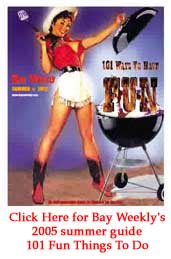 |
Dr. Gouin's Bay Gardener |
Too Mulch of a Good Thing
Part 6: What Makes a Good Mulch
My gardens are all mulched with leaves and compost. Here’s how to make such mulches yourself.
In the fall, in place of bagging your leaves, rake them under the branches of your shrubs and into your garden. Keep them in place by sprinkling compost over them and wetting them down. The leaves will decompose, releasing their nutrients over time, thus feeding your plants in much the same way that forest trees are nourished.
Compost the extra leaves you are unable to push under the branches of the shrubs or in the garden; next fall you will have compost to sprinkle over the leaves. If you don’t have your own compost available, you can purchase LeafGro, Chesapeake Blue, Chesapeake Green, TopPro or Orgro to sprinkle over the leaves when you rake them in place this fall.
Wetting the mulching down with three tablespoons of dish detergent in five gallons of water after you have sprinkled the leaves with compost will help to hasten decomposition. Getting the leaves wet soon after pushing them under the shrubs and in the garden also helps keep them in place. Frequent light sprinkling after you have raked the leaves also helps keep them in place.
If you must use a wood-waste mulch, consider pine bark and do not apply more than two inches. Before applying, cultivate the old mulch into the soil to prevent the accumulation of humus layer over the soil. If you insist on applying mulch and do not want to use mulches made from wood waste or compost, purchase pine needles. Pine needles are brown, decompose and leave very little residue.
Professor Emeritus Francis Gouin retired from the University of Maryland, where he was the state’s extension specialist in ornamental horticulture. Follow his column of practical gardening and plant advice every week, only in Bay Weekly. Ask Dr. Gouin your questions at [email protected].



